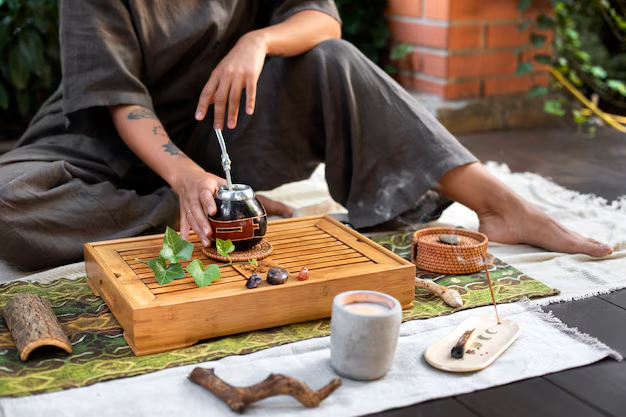Ayurvedic Home Remedies for Common Ailments
Ayurvedic Home Remedies for Common Ailments the ancient system of medicine originating from India offers a treasure trove of natural remedies for various common ailments. Rooted in a deep understanding of the interconnectedness of body, mind, and spirit, Ayurvedic Home Remedies for Common Ailments remedies aim not only to alleviate symptoms but also to address the underlying imbalances that cause them. These remedies often utilize herbs, spices, oils, and other natural ingredients that are readily available and easy to incorporate into daily life. I

Digestive Issues
**1. Ginger and Lemon Tea: Ginger is a potent digestive aid in Ayurveda, known for its ability to stimulate agni (digestive fire). Lemon adds a refreshing twist and helps balance pH levels.
- Recipe: Boil 1 cup of water, add a few slices of fresh ginger and let it simmer for 5-10 minutes. Squeeze in half a lemon and drink warm.
**2. Triphala Powder: Triphala is a blend of three fruits (amla, bibhitaki, and haritaki) known for their gentle laxative and detoxifying properties.
- Usage: Mix 1 teaspoon of Triphala powder in warm water and drink before bedtime to support regular bowel movements and overall digestive health.
Cold and Cough
**1. Turmeric Milk: Turmeric is revered in Ayurveda for its anti-inflammatory and immune-boosting properties.
- Recipe: Warm 1 cup of milk (dairy or plant-based), add 1/2 teaspoon of turmeric powder, a pinch of black pepper, and sweeten with honey. Drink before bedtime to soothe a sore throat and promote restful sleep.
**2. Steam Inhalation with Eucalyptus Oil: Steam inhalation helps clear nasal passages, while eucalyptus oil has antibacterial and decongestant properties.
- Method: Boil water, add a few drops of eucalyptus oil, and inhale the steam while covering your head with a towel.
Skin Issues
**1. Aloe Vera Gel: Aloe vera is cooling and soothing, making it ideal for skin irritations like sunburns or rashes.
- Application: Extract gel from an aloe vera leaf and apply directly to affected areas for instant relief and healing.
**2. Neem Oil: Neem is renowned for its antibacterial and antifungal properties, making it effective against acne and other skin infections.
- Usage: Dilute neem oil with a carrier oil (like coconut oil) and apply to affected areas. Leave it on for 30 minutes before washing off.
Stress and Anxiety
**1. Ashwagandha Tea: Ashwagandha is an adaptogenic herb that helps the body cope with stress and anxiety.
- Recipe: Boil 1 cup of water, add 1/2 teaspoon of ashwagandha powder, and simmer for 5 minutes. Strain and drink warm.
**2. Abhyanga (Self-Massage): Abhyanga with warm sesame or coconut oil nourishes the nervous system and promotes relaxation.
- Method: Warm the oil slightly, massage it into your body in gentle, circular motions before showering.
Headaches
**1. Peppermint Oil: Peppermint oil has a cooling effect and can relieve tension headaches.
- Application: Dilute a few drops of peppermint oil with a carrier oil (like almond or coconut oil) and apply to temples and forehead.
**2. Pranayama (Breathing Exercises): Deep breathing exercises calm the mind and improve circulation, reducing headache intensity.
- Technique: Sit comfortably, close your eyes, and focus on deep, slow breaths. Inhale deeply through your nose, hold for a moment, and exhale through your mouth.
Menstrual Cramps
**1. Fennel Tea: Fennel seeds are carminative and help relieve bloating and cramps during menstruation.
- Recipe: Boil 1 cup of water, add 1 teaspoon of fennel seeds, and let it steep for 10 minutes. Strain and drink warm.
**2. Heat Therapy: Applying heat to the lower abdomen relaxes muscles and eases menstrual pain.
- Method: Use a heating pad or hot water bottle and place it on your lower abdomen for 15-20 minutes.
Joint Pain
**1. Turmeric Paste: Turmeric’s anti-inflammatory properties make it effective against joint pain and arthritis.
- Recipe: Mix turmeric powder with water to form a paste. Apply directly to affected joints and leave it on for 20-30 minutes before washing off.
**2. Ginger Compress: Ginger’s warming effect helps improve circulation and reduce inflammation.
- Method: Grate fresh ginger, wrap it in a cloth, and apply as a compress to sore joints for 15-20 minutes.









Leave a reply